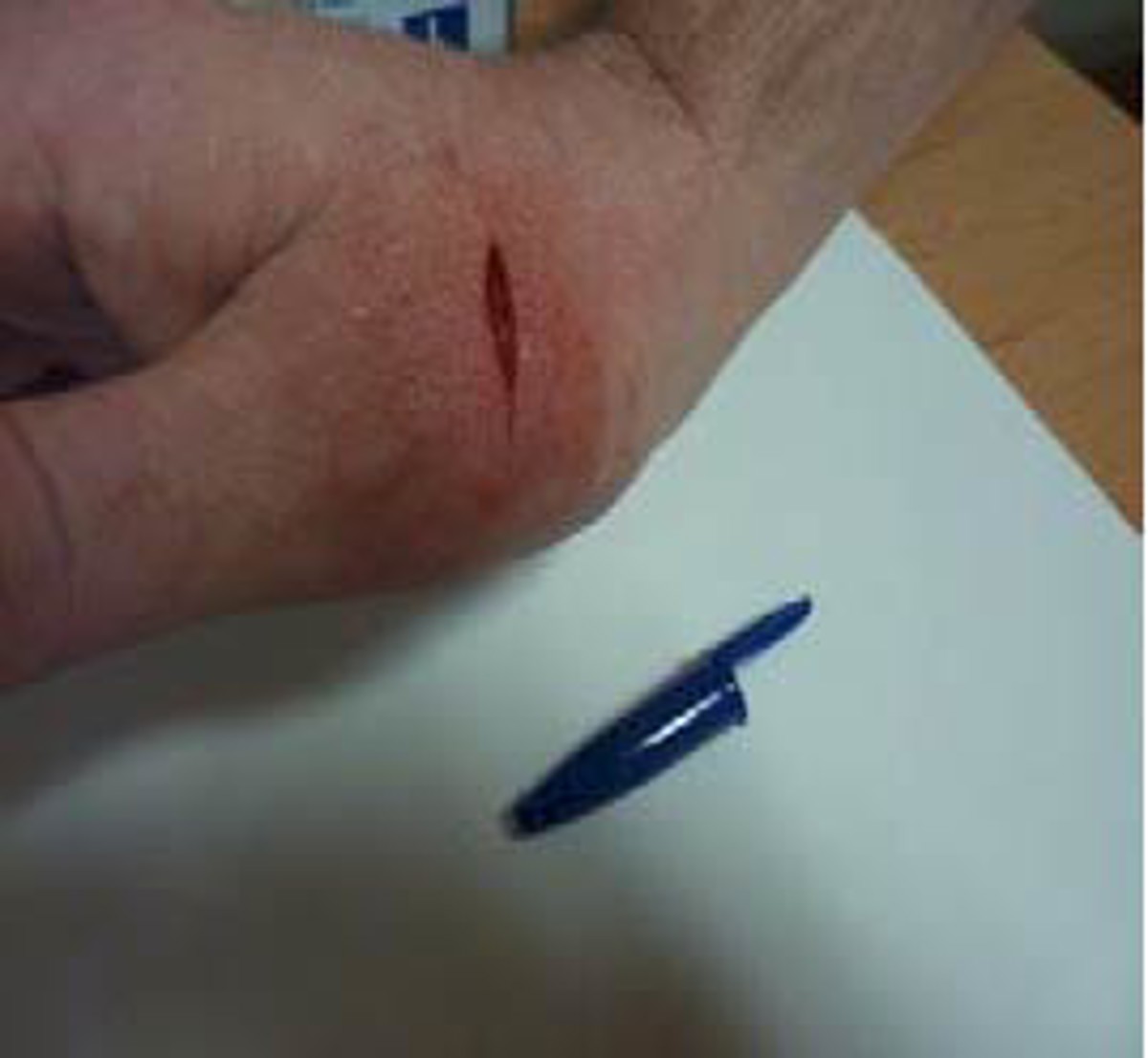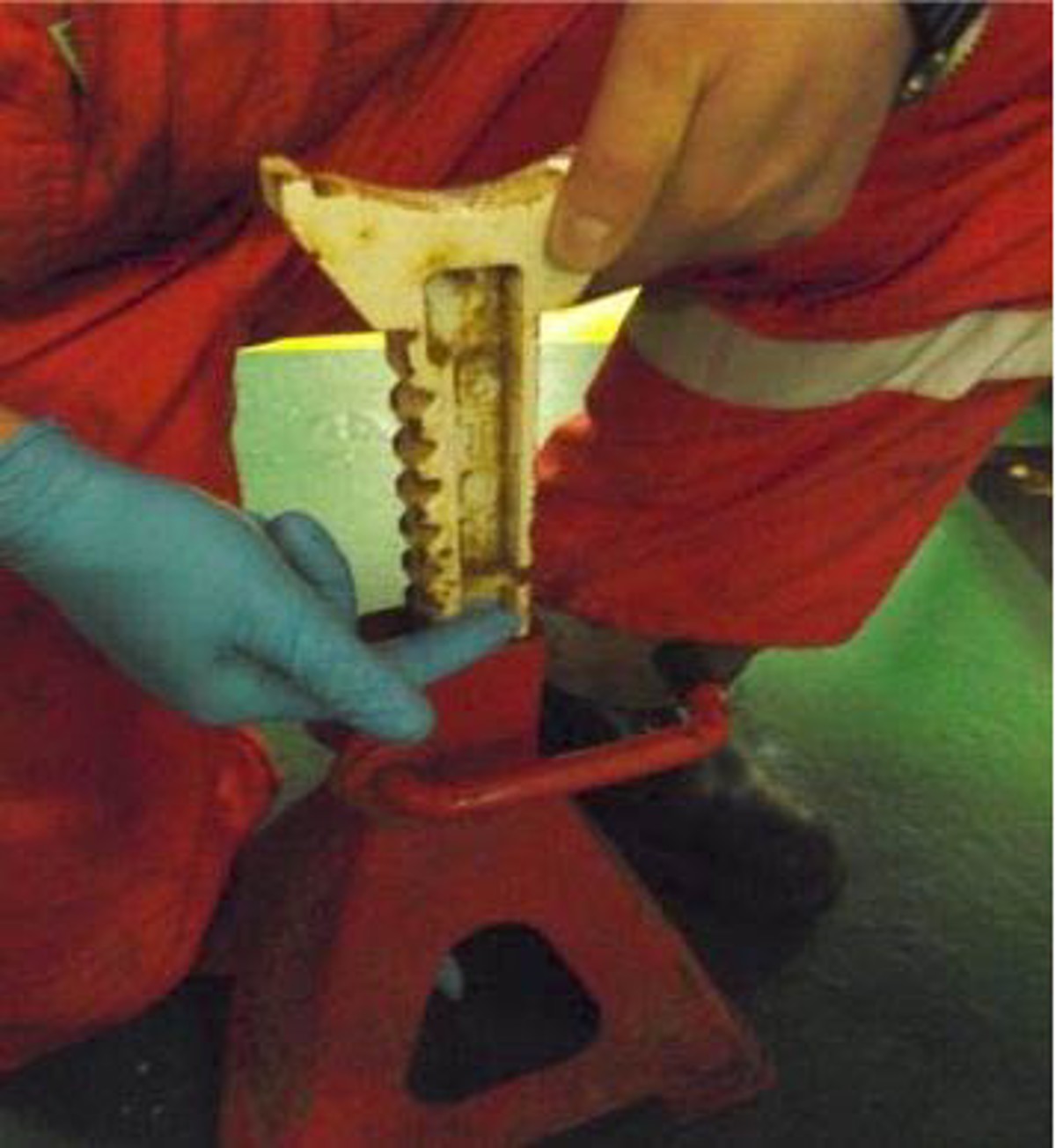Finger and hand injuries
- Safety Flash
- Published on 4 April 2013
- Generated on 16 January 2026
- IMCA SF 05/13
- 4 minute read
A Member has reported two incidents in which crew suffered finger or hand injuries.
First Incident
In the first incident, the injured person was preparing a meal in the galley. He placed a chopping board on a worktop and placed a knife on top of the chopping board. As he moved around the galley, carrying out various tasks, the knife slipped from the chopping board and landed with the blade protruding over the edge of the worktop.
The injured person was unaware of this and while walking past the worktop his right hand made contact with the blade of the knife, causing a 2cm laceration to the fleshy part of the hand, between the base of his thumb and index finger. The wound was cleaned and closed with three sutures. The injured person resumed normal duties the following day.

2cm laceration caused by knife blade
The company’s investigation revealed that the root causes of the incident were:
- The cook was attempting to undertake too many tasks at the same time whilst working alone at a busy time.
- Assistance from other team members was not sought during a busy period in the galley.
- Existing safety systems were not followed, i.e. knife handling policy and Task Based Risk Assessment (TBRA).
Second Incident
In the second incident, the injured person was working in the Bell Hangar. At the time of the incident an external auditor was carrying out an audit of the dive system. As part of the audit the diving bell was required to be moved over the access and inspection pit. Once the bell was transferred over the access pit two axle stands were placed under the bell’s bump frame.
The first axle stand was required to be adjusted for height; during this adjustment the injured person’s right index finger got nipped in the extension mechanism. This resulted in an injury to the tip of the right index finger, which the injured person initially considered trivial and finished his work task.
On examination his finger was bleeding and when reported to the medic a protective dressing was applied.

illustration of where finger was pinched during adjustment of the axle stand
The company’s investigation revealed that the root causes of the incident were:
- Because they deemed the activity to be ‘routine’, persons doing the task did not communicate the need to move the dive bell and therefore there was no supervisory support in place at the time.
- No Task Based Risk Assessment (TBRA) or toolbox talk / pre-task assessment was carried out.
- The team involved in the task failed to consider conducting risk assessment as a priority before carrying out the task.
Lessons learnt from both incidents
The company’s investigation included a review of both incidents to identify whether there was any commonality between the root causes of both incidents. Some of the lessons learnt include:
- Ask for help if and when required – especially working in potentially hazardous areas (bell garage) and/or busy working areas (galley during meal service times).
- Appropriate supervision/supervisory support is essential in ensuring policies and safe methods of work/working tools are used.
- Supervisors should be informed of any hazardous activities being undertaken, before starting, to ensure adequate levels of additional personnel and / or supervision is provided to ensure HSE policies and management system requirement are applied.
- Safety policies and safe systems of work are put in place to assist in the protection of people, the environment, plant and equipment etc. Failure to comply with these has a detrimental effect on safety and can lead to instances of injury, damage or loss as demonstrated by the two finger injury incidents.
- Inadequate planning and risk assessing work tasks can result in potential hazards and control measures being overlooked.
IMCA Safety Flashes summarise key safety matters and incidents, allowing lessons to be more easily learnt for the benefit of the entire offshore industry.
The effectiveness of the IMCA Safety Flash system depends on the industry sharing information and so avoiding repeat incidents. Incidents are classified according to IOGP's Life Saving Rules.
All information is anonymised or sanitised, as appropriate, and warnings for graphic content included where possible.
IMCA makes every effort to ensure both the accuracy and reliability of the information shared, but is not be liable for any guidance and/or recommendation and/or statement herein contained.
The information contained in this document does not fulfil or replace any individual's or Member's legal, regulatory or other duties or obligations in respect of their operations. Individuals and Members remain solely responsible for the safe, lawful and proper conduct of their operations.
Share your safety incidents with IMCA online. Sign-up to receive Safety Flashes straight to your email.